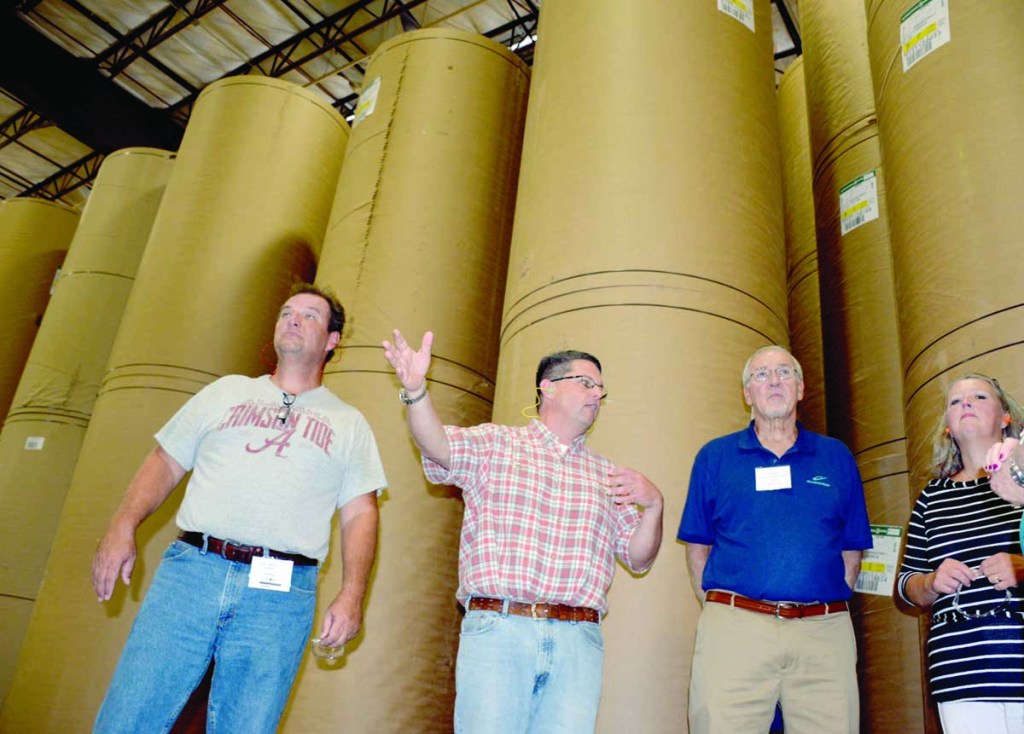Breaking the ‘factory stigma’
Published 6:00 am Thursday, August 6, 2015

- Rusken Packaging sales director Jim Baker, center, leads a tour of the plant on Wednesday.
First-year English teacher Kalie Faulk traded her classroom for a crash course in local industry on Wednesday, as part of an ambitious effort between local school and industry leaders to give educators a first-hand look at the jobs available in Cullman County.
After spending the better part of an hour learning everything there is to know about corrugated packaging — aka making boxes — at Rusken Packaging, Faulk said she has a brand new perspective to take into her Cullman Area technology Academy classroom this fall.
“This is something I can use to show my students the options that are out there and the skills they’ll need to get these jobs,” Faulk said. “As we’ve seen, you need an education and a good work ethic. This makes it so much easier to convey how those skills from the classroom connect to the real world.”
Veteran Good Hope librarian Renee Marty noted career tech could provide more attainable goals, to encourage students to follow a specific path toward certification for a career after high school.
“It’s a good starting point to get them to Wallace State, and maybe even further,” she said.
Faulk and Marty were among hundreds of teachers participating in the program as part of the Cullman County Board of Education’s institute day, which included tours of a dozen local industries, accompanied by seminars about industrial growth and career technical skills.
Cullman Economic Development Agency Assistant Director Dale Greer said he hopes the project will provide a new perspective for local educators, and help show how industry jobs have changed in recent years.
“The stereotype is that jobs in industry are dirty, manual labor, unskilled, low wage, and no future,” he said. “The purpose of the tours are to dispel that myth. Many of these plants offer higher than average wages and fringe benefits.”
Greer said the goal is to encourage teachers to consider how curriculum relates to the real world with hands-on examples, while also showing educators there are viable technical jobs that can be obtained with certification or two-year technical degrees — as opposed to four years (and possibly a lot of debt) at a university.
A focus was also placed on “soft skills,” for students, such as punctuality and critical thinking.
“Many of the foremen, shift supervisors, department heads and plant managers worked their way up from entry-level positions, or certainly low-level positions,” Greer explained. “In industry, experience, education, performance, dependability and work ethic affect personal wages and advancement.”
Greg Rusk, owner of Rusken Packaging, said he was proud to host a group of approximately 20 teachers.
“I think it went really well, and I really hope they bought in to learning a bit more about industry,” he said. “I think it’s a really good thing to do.”
Cullman County is one of the most successful micropolitans in Alabama for new and expanding industry, with more than 700 jobs and $143 million in new investment created in 2014.
Officials say one of the biggest issues facing the Cullman area is sluggish population growth of less than 3 percent each year. With more industrial jobs being created by the month, development and retention of workforce has become a key priority. Statistics from the Bureau of Labor show the majority of Alabama jobs, 60 percent, fall in the “middle-skill” region, meaning they require some post-high school training, but not a full four-year degree.
Dr. Philip Cleveland, director of career tech and workforce development at the state department of education, said he plans to use the Cullman industry tour as a model to follow in communities across Alabama.
“This is a benchmark to help other communities see the importance of project-based learning, and making learning relevant as a way to keep students engaged,” he said. “Even something as simple as organizing a notebook, those skills become more relevant when teachers see how it relates to the workplace.”
State schools superintendent Dr. Tommy Bice praised Cullman County schools for piloting a program of this nature on such a grand scale, and said it fits with the state’s Plan 2020 initiative to equally prepare students for both college and careers.
After spending months meeting with industry leaders about what they want to see in future employees, Bice said he discovered a fundamental flaw with the approach to education in Alabama — a flaw he’s working hard to fix.
“One common response rose to the top: Kids leaving Alabama schools lack intellectual curiosity, and the reason is that we’ve spent 12 years preparing students to pass a test, and not preparing them to think,” he said. “Every child who graduates should have a choice when they leave, that leads to a brighter future…We’ve seen if we can help academics and real world experience come together, that can be a game-changer.”
Participating industries included Royal Technologies, Alabama Cullman Yutaka Technologies, Rusken Packaging, West Rock, Cullman Cabinet, Wallace State Community College, General Dynamics, Topre America Corporation, Cash Acme / Reliance Worldwide, REHAU, WalMart Distribution Center, Inland Buildings and Serta Mattress Company.





